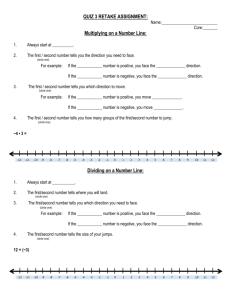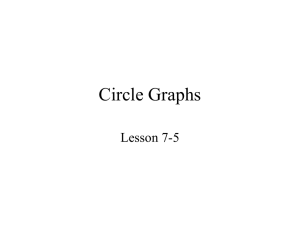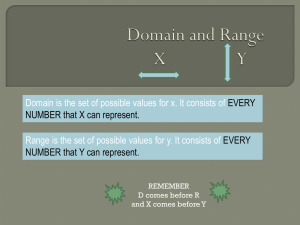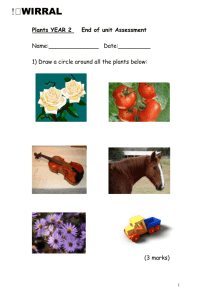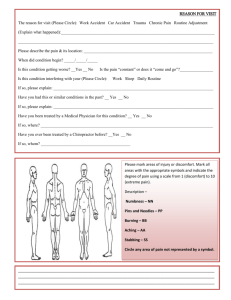Tutors notes 1 The woodcraft Experience.doc
advertisement
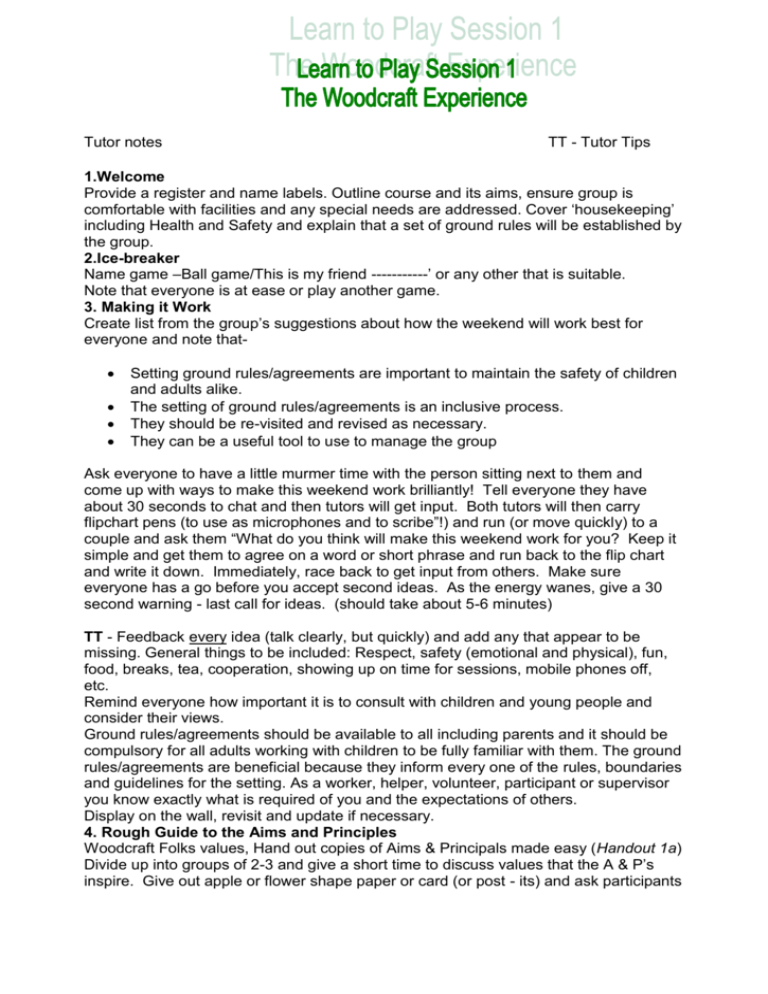
Tutor notes TT - Tutor Tips 1.Welcome Provide a register and name labels. Outline course and its aims, ensure group is comfortable with facilities and any special needs are addressed. Cover ‘housekeeping’ including Health and Safety and explain that a set of ground rules will be established by the group. 2.Ice-breaker Name game –Ball game/This is my friend -----------’ or any other that is suitable. Note that everyone is at ease or play another game. 3. Making it Work Create list from the group’s suggestions about how the weekend will work best for everyone and note that Setting ground rules/agreements are important to maintain the safety of children and adults alike. The setting of ground rules/agreements is an inclusive process. They should be re-visited and revised as necessary. They can be a useful tool to use to manage the group Ask everyone to have a little murmer time with the person sitting next to them and come up with ways to make this weekend work brilliantly! Tell everyone they have about 30 seconds to chat and then tutors will get input. Both tutors will then carry flipchart pens (to use as microphones and to scribe”!) and run (or move quickly) to a couple and ask them “What do you think will make this weekend work for you? Keep it simple and get them to agree on a word or short phrase and run back to the flip chart and write it down. Immediately, race back to get input from others. Make sure everyone has a go before you accept second ideas. As the energy wanes, give a 30 second warning - last call for ideas. (should take about 5-6 minutes) TT - Feedback every idea (talk clearly, but quickly) and add any that appear to be missing. General things to be included: Respect, safety (emotional and physical), fun, food, breaks, tea, cooperation, showing up on time for sessions, mobile phones off, etc. Remind everyone how important it is to consult with children and young people and consider their views. Ground rules/agreements should be available to all including parents and it should be compulsory for all adults working with children to be fully familiar with them. The ground rules/agreements are beneficial because they inform every one of the rules, boundaries and guidelines for the setting. As a worker, helper, volunteer, participant or supervisor you know exactly what is required of you and the expectations of others. Display on the wall, revisit and update if necessary. 4. Rough Guide to the Aims and Principles Woodcraft Folks values, Hand out copies of Aims & Principals made easy (Handout 1a) Divide up into groups of 2-3 and give a short time to discuss values that the A & P’s inspire. Give out apple or flower shape paper or card (or post - its) and ask participants to put 1 value per shape or post it and display on a Value Tree (pre-drawn by you on a flip chart paper. Ask group to stand in a large circle and take turns to match to A&P’s with the values on the tree, note the differences/similarities. This can also be done in twos round a table if the group is small or in small groups. 5. Woodcraft Folk Structure - Give out copies of Woodcraft Folk Structure - Handout 1b. Let participants read thru and digest a bit. Answer any questions that may arise. 6. Benefits of Belonging to a Woodcraft Folk Group Paper Carousel: An information gathering exercise in small groups. Split the group into 4 groups. Give each group a piece of flip chart paper (or other large paper as available) with a subject or question at the top, for example: What are the benefits of belonging to a WCF group for: 1. Young People 2. Adults 3. The local community 4. The wider world Give each group 4 minutes to write down their idea on their sheet, then move the pieces of paper around the groups. Give each group another 3 minutes with their new sheet, ticking the ones they agree with, putting an X next to the ones they don’t agree with, then adding any new comments to the list. Continue the carousel by moving the sheets until all 4 groups have their own sheets back and then have each group feedback the lists. TT - This is a structured way to get everyone to consider a number of issues. Working in small groups encourages many of the skills, concepts and attributes of cooperation. Only one person in the group has to be confident about writing down the ideas. Ideas are not repeated It allows everyone to have their say / opinion in a non-threatening way. Watch time very closely, if the discussions are getting off-track by 3rd or 4th change, then decrease time. Let each group feedback, but give a time limit of 3-4 minutes each and stick to it. Hang all flipcharts up on the wall to view for further discussion/comment during breaks. 7. Energizer - This game can be helpful for learning names, but it is mainly a bit of fun and a great way to relax and establish a fun atmosphere. Everyone stands in a circle. The tutor begins by walking into the centre of the circle modelling a particular walk (can be funny, straightforward, whatever). When he/she gets to the centre of the circle, he/she looks around the circle, waves to the group and says, “Hi, my name is _____”. The person then does their walk back to their place in the circle. Everyone else then mimics the person’s walk into the centre of the circle. When they reach the centre, they turn to the person, wave in unison and say “Hi ____! They then return to their places in the circle. One by one, moving around the circle to the left, participants walk a special walk into the circle, say hi, return, and the group copies them. TT - You can make a request for everyone to really get dramatic by using their “cheese cards”, which are conveniently located in their back pockets. Instead of just saying “Hi ____!”, Everyone faces the person with a huge smile and says in their campiest way, “Hi _____,…..You’re Special!!!!” and then return to their places. This always ends in a giggle!! 8. .Play Space Design and draw a play space on a large piece of paper (A1), ask groups to think about resources and equipment first and incorporate these into designs, consider safety and how it will influence the planning of these spaces. Let each group feedback their designs (a set time of 3-4 minutes may be a good idea) Put these on display if possible, if not keep plans with materials for H&S session. 9. End of session with thanks for contributions, Hand out Reflective Diary and ask learners to complete it as the course progresses and note the most important strands of the sessions for them. Have a short comfort break if continuing with next session. Evaluation: The Wind Blows: Everyone stands in a circle. Tutor gives a series of statements e.g. “The wind blows everyone who understand the Aims and Principles”, or “The wind blows everyone who has enjoyed this session”. Or “I have a better understanding of the benefits of belonging to a Woodcraft Folk group”. Everyone who agrees with the statement must change places with someone else who also agrees. (Those with a dramatic flare will drift in the wind either gently wisping about or storming through to the other side) TT - This activity can also be used as a starter as a get to know you. For example, statements such as “The wind blows everyone who likes marmite”, or “The wind blows everyone who has a brother” or “Everyone who has picked up a piece of litter this week” could be used.


